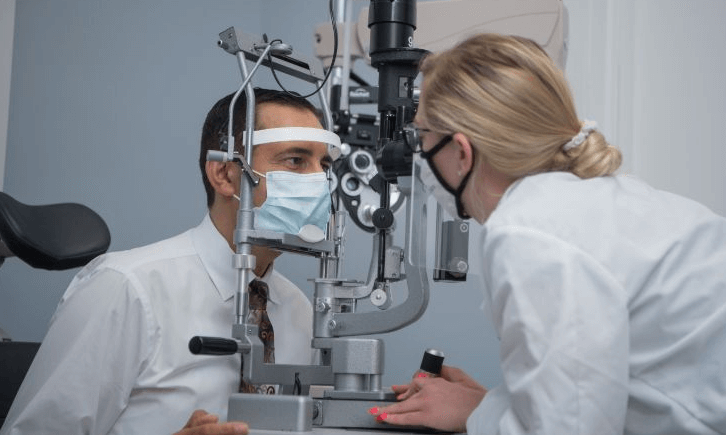How to Choose the Right Optometrist

Introduction
Choosing the right optometrist is essential for maintaining good eye health and ensuring that your vision needs are properly addressed. Whether you’re selecting an optometrist for a routine eye exam, contact lenses, or treatment of a specific eye condition, making an informed decision can significantly impact your overall well-being. With so many options available, it can be challenging to know where to start. In this article, we will guide you through the process of finding the right optometrist, covering everything from understanding their qualifications to evaluating their services and reputation.
Understanding the Role of an Optometrist
An optometrist is a healthcare professional who specializes in eye care, including vision testing, prescribing corrective lenses, and diagnosing and managing eye conditions. Unlike ophthalmologists, who are medical doctors specializing in eye surgery and treatment of severe eye diseases, optometrists typically focus on primary vision care. They are trained to detect eye abnormalities, prescribe medications for certain eye conditions, and provide preventive care.
Optometrists are essential in maintaining eye health, particularly for individuals with vision problems or those at risk of developing eye diseases. They play a critical role in identifying early signs of conditions such as glaucoma, cataracts, and macular degeneration. Regular visits to an optometrist can help prevent vision loss and ensure that your eyes remain healthy throughout your life.
Types of Eye Care Professionals: Optometrist vs. Ophthalmologist
When choosing an eye care professional, it’s important to understand the differences between an optometrist and an ophthalmologist. As mentioned earlier, an optometrist provides primary eye care services, while an ophthalmologist is a medical doctor who can perform eye surgery and treat more complex eye conditions.
If you need routine eye exams, glasses, or contact lenses, an optometrist is typically the right choice. However, if you have a serious eye condition that requires surgery or specialized treatment, you may need to see an ophthalmologist. Some optometrists work closely with ophthalmologists, referring patients to them when advanced care is needed. Understanding the distinction between these two types of eye care professionals will help you make an informed decision based on your specific needs.
Importance of Regular Eye Exams
Regular eye exams are crucial for maintaining good eye health, even if you don’t currently wear glasses or contact lenses. During an eye exam, an optometrist can detect early signs of eye diseases that may not have noticeable symptoms, such as glaucoma or diabetic retinopathy. These conditions, if left untreated, can lead to permanent vision loss.
For children, regular eye exams are essential for detecting vision problems that could affect their learning and development. For adults, especially those over 40, eye exams become increasingly important as the risk of eye diseases increases with age. By choosing the right optometrist and scheduling regular check-ups, you can ensure that your eyes are healthy and that any potential issues are caught early.
Qualifications and Credentials to Look For
When choosing an optometrist, it’s essential to verify their qualifications and credentials. An optometrist should have a Doctor of Optometry (OD) degree, which requires four years of post-graduate education following a bachelor’s degree. They must also be licensed to practice in your state, which involves passing a series of examinations.
In addition to their basic qualifications, some optometrists may have additional certifications or specialize in specific areas of eye care, such as pediatric optometry or low vision rehabilitation. If you have specific eye care needs, it’s worth considering an optometrist with relevant experience or specialized training.
Experience Matters: Finding an Experienced Optometrist
Experience is a key factor when choosing an optometrist. An experienced optometrist is more likely to accurately diagnose and treat a wide range of eye conditions. They are also better equipped to handle complex cases and can provide you with a higher level of care.
When researching potential optometrists, consider how long they have been practicing and whether they have experience in treating patients with similar needs to yours. You can often find this information on their practice’s website or by contacting the office directly.
Specializations in Optometry
Optometrists may specialize in various areas of eye care, depending on their training and interests. Some common specializations include:
- Pediatric Optometry: Focuses on eye care for children, including the diagnosis and treatment of vision problems that can affect learning and development.
- Geriatric Optometry: Specializes in eye care for older adults, addressing age-related eye conditions such as cataracts and macular degeneration.
- Vision Therapy: Involves exercises and treatments designed to improve visual skills, often used for patients with binocular vision problems or eye coordination issues.
- Low Vision Rehabilitation: Provides care for patients with significant vision impairment that cannot be corrected with glasses or contact lenses.
If you have specific eye care needs, choosing an optometrist with a relevant specialization can ensure that you receive the best possible care.
Assessing the Optometrist’s Reputation
The reputation of an optometrist can provide valuable insight into the quality of care they provide. You can assess an optometrist’s reputation by reading online reviews, asking for recommendations from friends or family, and checking with local professional organizations.
Online review platforms, such as Google or Yelp, can give you a sense of what other patients have experienced. Look for patterns in the reviews, such as consistent praise for the optometrist’s thoroughness or concerns about long wait times. While individual reviews should be taken with a grain of salt, overall trends can help you gauge the optometrist’s reputation.
Evaluating Office Location and Accessibility
The location of the optometrist’s office is an important practical consideration. Choosing an optometrist who is conveniently located near your home or workplace can make it easier to keep appointments and access care when needed.
In addition to location, consider the office’s accessibility. Is the office wheelchair accessible? Do they offer parking or public transportation options? Accessibility is particularly important for older adults or individuals with mobility issues. A convenient and accessible location can reduce stress and make it easier to maintain regular eye care visits.
Office Hours and Availability: What Works for You?
Optometrists’ office hours can vary, and it’s important to choose one whose schedule aligns with your needs. Consider your work hours, family obligations, and other commitments when evaluating an optometrist’s availability.
Some optometrists offer evening or weekend appointments, which can be particularly convenient if you have a busy schedule. Additionally, check whether the optometrist is available for emergency appointments. Eye emergencies can occur unexpectedly, and knowing that your optometrist can accommodate urgent visits can provide peace of mind.
The Importance of Modern Technology in Eye Care
Modern technology plays a crucial role in providing accurate and efficient eye care. When choosing an optometrist, consider whether their office is equipped with the latest diagnostic tools and technology.
Advanced equipment, such as digital retinal imaging or optical coherence tomography (OCT), allows optometrists to detect eye conditions at their earliest stages. This technology can lead to more accurate diagnoses and better treatment outcomes. An optometrist who invests in modern technology demonstrates a commitment to providing high-quality care.
Personal Comfort and Communication Style
Your comfort with the optometrist and their communication style is an important, often overlooked, aspect of choosing an eye care provider. You should feel comfortable asking questions and discussing your concerns with your optometrist.
During your initial consultation, pay attention to how the optometrist communicates. Are they patient and willing to explain things clearly? Do they listen to your concerns and take the time to address them? A good rapport with your optometrist can make your visits more pleasant and ensure that you feel confident in the care you receive.
Insurance and Payment Options
Eye care can be costly, so it’s important to consider your insurance coverage and payment options when choosing an optometrist. Check whether the optometrist accepts your insurance plan and what services are covered.
If you don’t have insurance, or if your insurance doesn’t cover certain services, inquire about the payment options available. Some optometrists offer payment plans or discounts for cash payments. Understanding the financial aspects of your care can help you avoid unexpected expenses.
Recommendations and Referrals
Recommendations from friends, family, or your primary care physician can be invaluable when choosing an optometrist. People you trust can provide firsthand insights into their experiences, helping you make a more informed decision.
If you have a specific eye condition or need specialized care, your current healthcare providers may be able to refer you to an optometrist with the expertise you need. Referrals can be especially helpful if you’re new to an area or unsure where to start your search.
Questions to Ask During Your First Visit
Your first visit to an optometrist is an opportunity to assess whether they are the right fit for you. Prepare a list of questions to ask during your appointment, such as:
- What is your experience with treating [specific condition]?
- What tests will you perform during my exam, and what do they involve?
- How often should I schedule eye exams?
- What are my options for vision correction, and what do you recommend?
- How do you handle emergency appointments?
Asking these questions can help you gauge the optometrist’s expertise and ensure that their approach aligns with your needs.
Trial Period: Testing the Waters
It’s okay to switch optometrists if your first choice doesn’t meet your expectations. Consider your initial visits as a trial period. If you don’t feel comfortable or if your concerns aren’t addressed to your satisfaction, it may be worth seeking a different provider.
Your relationship with your optometrist should be built on trust and confidence. Don’t hesitate to explore other options if you feel that your current optometrist isn’t the right fit for you.
Red Flags: When to Avoid an Optometrist
There are certain red flags to watch out for when choosing an optometrist. These include:
- Rushed Appointments: If the optometrist seems hurried and doesn’t take the time to address your concerns, it may be a sign that they aren’t fully committed to your care.
- Outdated Equipment: An office that lacks modern diagnostic tools may not be able to provide the most accurate or effective care.
- Poor Communication: If the optometrist is dismissive or difficult to communicate with, it can lead to misunderstandings or inadequate care.
- Negative Reviews: While no optometrist will have perfect reviews, consistently negative feedback about the same issues should be a cause for concern.
Pay attention to these warning signs, and don’t hesitate to look for another provider if you encounter them.
The Value of Second Opinions
If you receive a diagnosis or treatment recommendation from an optometrist and you’re unsure about it, seeking a second opinion is a wise choice. A second opinion can confirm the diagnosis, provide alternative treatment options, or offer reassurance.
Getting a second opinion is particularly important for serious conditions or if the recommended treatment is invasive or costly. An optometrist who values your care will support your decision to seek additional advice.
The Long-Term Relationship with Your Optometrist
Choosing the right optometrist isn’t just about finding someone for a single visit; it’s about establishing a long-term relationship. A good optometrist will track your eye health over time, monitor any changes, and adjust your care as needed.
Building a long-term relationship with your optometrist can lead to better health outcomes, as they become more familiar with your unique needs and preferences. Over time, this relationship can provide continuity of care that is vital for managing chronic eye conditions or adjusting to changes in your vision.
FAQs
What qualifications should I look for in an optometrist? Look for an optometrist with a Doctor of Optometry (OD) degree and a valid state license. Additional certifications or specializations can also be beneficial depending on your needs.
How often should I have my eyes examined? For most adults, it’s recommended to have an eye exam every one to two years. However, those with certain risk factors or existing eye conditions may need more frequent exams.
Can an optometrist treat eye diseases? Yes, optometrists can diagnose and manage many eye diseases. However, for more complex conditions requiring surgery, you may need to see an ophthalmologist.
What is the difference between an optometrist and an ophthalmologist? An optometrist provides primary eye care, including vision testing and the diagnosis of eye conditions. An ophthalmologist is a medical doctor who can perform surgery and treat more complex eye diseases.
Is it important for an optometrist to use modern technology? Yes, modern diagnostic tools can improve the accuracy of diagnoses and the effectiveness of treatment. An optometrist who invests in the latest technology demonstrates a commitment to high-quality care.
How do I know if I need to see an optometrist or an ophthalmologist? If you need a routine eye exam, glasses, or contact lenses, an optometrist is usually the right choice. If you have a serious eye condition or need surgery, you should see an ophthalmologist.
Conclusion
Choosing the right optometrist is a critical decision that can have a lasting impact on your eye health. By considering factors such as qualifications, experience, reputation, and the use of modern technology, you can make an informed choice that meets your needs. Remember, your relationship with your optometrist should be one of trust and confidence, ensuring that you receive the best possible care for your vision. Whether you need routine eye exams, specialized care, or treatment for an eye condition, the right optometrist can help you maintain healthy eyes and clear vision for years to come.







